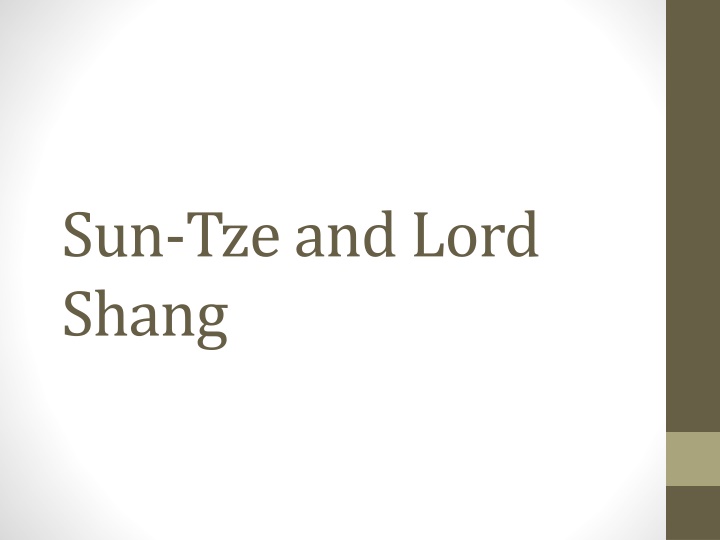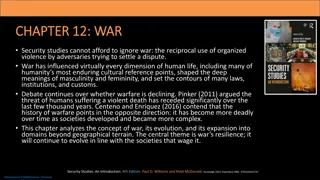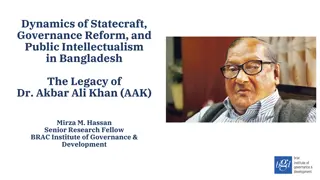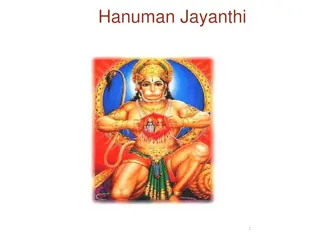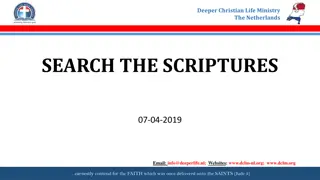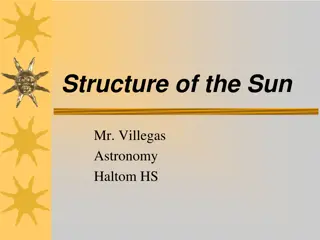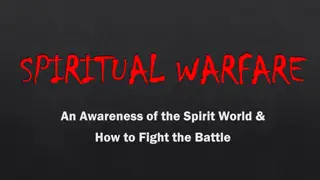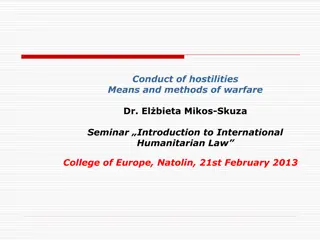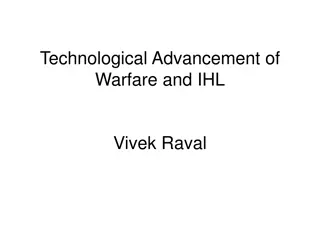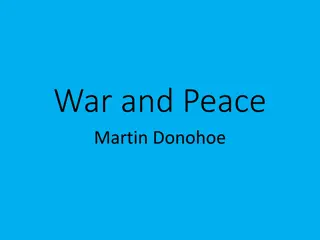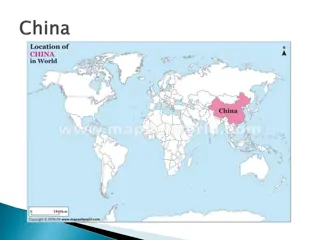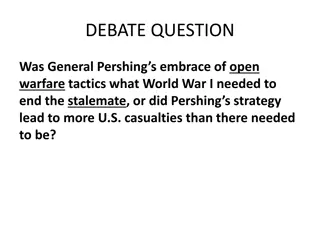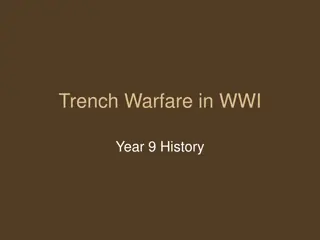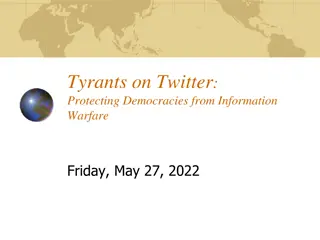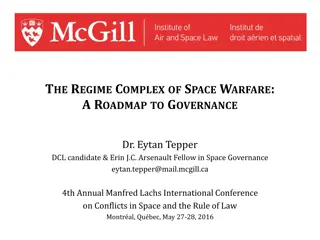Sun-Tze and Lord Shang: Insights into Warfare and Statecraft
Sun-Tze and Lord Shang were figures from ancient China, known for their contributions to military strategy and statecraft during a period of conflict and diplomacy among states. Sun-Tze emphasized the art of war and defense as crucial for a state's survival, while discussing the causes of war related to security and power struggles. Lord Shang's ideas focused on governance and the state's pursuit of strength through resource acquisition. Both authors provide valuable insights into the dynamics of state interactions and the role of warfare in shaping political landscapes.
Download Presentation

Please find below an Image/Link to download the presentation.
The content on the website is provided AS IS for your information and personal use only. It may not be sold, licensed, or shared on other websites without obtaining consent from the author.If you encounter any issues during the download, it is possible that the publisher has removed the file from their server.
You are allowed to download the files provided on this website for personal or commercial use, subject to the condition that they are used lawfully. All files are the property of their respective owners.
The content on the website is provided AS IS for your information and personal use only. It may not be sold, licensed, or shared on other websites without obtaining consent from the author.
E N D
Presentation Transcript
Sun-Tzeand Lord Shang
Contexts: Sun Tze Probably born and active during the latter part of the 6thcentury BC (ca 544-496 ), during the later Spring and Autumn period. Probably a military official in the state of Wu, though said to be born in Qi. The late Spring and Autumn period was one of conflict among the states that remained after a period of internal consolidation in which smaller states had been swallowed by larger ones. It was also a period of struggle in which central state rulers attempted to take power back from regional feudal officials within states. So it was a period of conflict, though also marked by extensive diplomacy among the various states.
Sun-Tze: Fundamental Assumptions Argues (chapter 1) that understanding war as an art is of vital importance to the state. War is a state of conflict that exists between two or more states Fundamental importance of defense as a way of perpetuating the life of a state Important to the state As a collective, political entity As an entity that is not necessarily permanent That are of different types (e.g., united with ruler or not so united) Implies that humans as individuals are not naturally violent: War occurs between states and is spurred by the actions of states Individuals in armies must be motivated to fight: roused to anger, motivated by rewards to strive for victory Populations become weary of war Thus war as an activity is artificial action when it comes to human nature, to be studied in terms of its various contexts It does, however, appear in this analysis to be a frequent and possibly inevitable outcome whenever various states come into contact with one another It is also the case that neither defense or war necessarily entail protracted fighting, or even fighting at all.
Causes of War The text does not unambiguously provide answers as to why states go to war (ie., enter into conflict), but strongly implies that wars are primarily caused by the state s quest for security and for power in the form of resources: Maneuvering for advantage and imperative to take advantage of every opportunity to strengthen the state may cause clashes hints of security dilemmas and arms races associated with defensive realism; Quest for more resources in terms of material and command of human populations desire for security may take an aggressive form in which neighboring states are taken over for their resources Aggressiveness may also stem from defensive origins: pre-emptive strikes to remove potential dangers from one s borders, prevent creation of rival alliances; prevent rivals from gaining additional resources through conquest by preventing conquest or beating rivals to conquest.
Security The text implies that security entails a variety of conditions that allow the state as an entity to survive and thrive Absence of foreign presence in territory Containment or elimination of threats of invasion Prevention of alliances among enemies or rivals Absence of rival or enemy presence in close proximity to territory Overall weakness of rivals and enemies Capacity to deter rivals, or if necessary to defeat rivals
Power The text appears to locate power in the following: Material resources: supplies of money; supplies of natural resources such as wood and metal; agricultural output Human resources: supplies of men for armies; presence of allies Morale: unity of people with ruler; willingness of armies to fight and to endure hardship Quality of leadership
Leadership Of these, leadership appears to be the most important part of power: Allows potential of other sources of power to be actualized Can supply remedies to defects or shortages of other sources of power Can provide victory in the face of shortages of other sources of power Can provide victory with the least expenditure of sources of power, thus ensuring the continued survival of the state in the context of future conflicts Thus, while war is about conflicts among states and thus presumes that states are necessary for war, how war itself plays out is dependent more upon the presence or absence of particular types of individuals than upon the nature of states or their other resources. Structure of state system does not cause war Relative position in state system does not strictly govern the outcomes of war
Good Leadership Leaders who are successful in war: Are extraordinary individuals: are relatively rare, possess qualities that most others do not possess; are able to see and do things that most others are not able to do (chapter 4) Possess particular types of knowledge: Human psychology in general, and of self and others Tactics and strategies Understanding of physical and economic terrains Possess particular virtues (types of excellences) that resemble the Aristotilean understanding of virtues as means between extremes: Neither cowardly nor foolhardy Neither overly cautious nor excessively aggressive, but embodies caution and aggression at appropriate times Always cool, never panics Takes measured and appropriate risks In control of emotions and appetites Conforms behavior to situations and contexts adaptable and flexible Focused always on the end goal of the enterprise; is not distracted by extraneous things such as pursuit of glory or vendettas
Strategy and Tactics Principles of good strategy and tactics: Always have eye on end goal, but also understand that route to that goal may be indirect and may entail not fighting Avoid confronting strength of enemy in preference for confronting his weakness Attempt to use enemy strength against him Attempt to conserve own strength while draining enemy of resources, and understanding enemies strength and weaknesses while concealing one s own Never fighting when chances of victory are not favorable and always attempting to create circumstances that create such chances Thus strategy and tactics: Not about particular techniques, but general and broad principles Are sensitive to contexts Use depends upon the good judgments of individuals; good judgment in the possession of the few rather than the many. Entails flexibility that recalls philosophical Daoism. Tactics and strategy about keeping opponents off balance, striking where least expected, turning opponent s strength against him while preserving and protecting own strength a kind of Akido strategy.
Lord Shang: Contexts Regarded as the sayings of the Lord of Shang, who was a Ch in state official from 359 to 338 BC., that is, during the Warring States period. Ch in one of many feudal states within a larger dynastic empire; was able during a short period of time to take over rival states and institute a system that took power away from feudal officials and concentrated it in a central administration. Shang s work belongs generally within the Legalist tradition, which emphasized the importance of the state, laws, rewards and punishments in keeping order, as opposed to rites, rituals, understandings of justice and the power of right example.
Assumptions Distinction between the state and the people: State is the system of laws and administration by which the ruler keeps citizens orderly and in obedience to him Thus the state is the tool of the ruler, used by him to his purpose and advantage, mainly the survival of his personal rule Citizens are subjected to the state, kept within prescribed bounds and molded by laws through the use of rewards and punishments Citizens are to be kept to a limited number of occupations, not allowed to stray into areas of politics, art, education, crafts, commerce in non- essential items; rather, agriculture and military primary occupations; trade in essential items tolerated. To be kept orderly through the use of laws rather than development of virtues or example, and particularly through the use of heavy punishment to deter even the slightest deviation from desired behavior Thus the state not the expression of the collective will of citizens, an instrument of keeping order among themselves, or collective security. It is apart from them and imposed upon them, providing them with little of intrinsic value.
Strength of State Ordering and organization of social, economic, and political lives that depends on laws and the operation of a system of rewards and punishment to keep order, provide unity, and mobilize resources for defense of state-- primary Savvy ruler versed in tactics and strategy, knowledgeable about conditions of and resources in own state-- secondary Resources: Population mainly devoted to agriculture, orderly, obedient, uneducated, productive, easily lead to war and manipulated by rewards to fight for the ruler Abundance of agricultural products to feed population and army and to trade for essential war goods. Inflow of migrants from neighboring and rival states, a development that weakens rivals (smaller population, less hands working in agriculture) and strengthens own (larger population from which to draw army, more hands working agriculture)
Dangers to state Big rival states Militarily strong enemy Weak army Strong (ambitious, collectively self-regarding, disobedient) people Disunited country Population devoted to non-essential occupations
Causes of war War is the condition of conflict among states: Individual citizens are not naturally violent (even if appear to be disorderly by rulers); they are, rather, self-interested and in natural condition do not see profit in war or problem in not fighting (given they have no real stake in the state); therefore, must be motivated to fight for prince by rewards and punishments. Thus war is a matter of conflict among states as the vehicles for the perpetuation of rule by leaders, not an expression of structure or unintended consequences of defensive moves. War is one of the two means (the other the development of agriculture) by which states ruled by particular leaders survive. Survival the end of all actions. Arise in particular situations due to: Defense against aggressive moves by enemies and rivals Pre-emptive strikes against professed enemies and rivals or nearby strong states who are feared because of their strength Expression of excessive power and energy inside state, which is better used in external strikes than allowed to remain with state, with resulting disorders, disunity, disloyalty and the development and growth of extraneous activities, such as learning, art, craftsmanship, trade in luxury items, and general abandonment of agriculture
War and Conflict Artificial in that they do not spring up from the nature of ordinary humans: Must be motivated to fight Must be deterred by punishment and enticed by rewards not to engage in a variety of non-martial pursuits learning, ethical and religious rituals, art, craftsmanship Are the clash between artificial entities (states) Ends are the perpetuation in power of particular people who set themselves up as the arbiters of correct conduct and acceptable occupations Whether one state exists or one or another ruler is in power in this analysis would not matter for the general population if the ruler followed this philosophy; therefore, there is no intrinsic reason to fight, who wins or loses a war, or to care about the perpetuation or end of a dynasty Of interest that foreign relations reduces in this understanding to wars, conflicts and ways of weakening and taking over neighboring states
Questions Differences between the two? Importance for thinking about international relations in thinking about: Concept of state Understanding of sources of conflict Factors in determining success in attaining international objectives What do we need to know about the state, leaders or humans in general in order to understand and explain international relations? Are Sun-tzu and Lord Shang helpful in coming to grips with those understandings? Why or why not?
